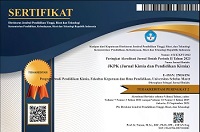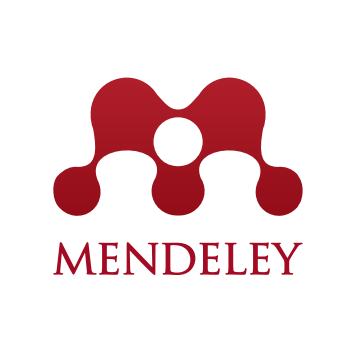Socratic Questioning Method in The Colloid System Topics Using The Participatory Action Research (PAR)
Abstract
The purpose of this research is to identify how lesson plans prepared based on socratic questions can improve critical thinking skills. Research method used is Participatory Action Research (PAR), data collection techniques through interviews and questionnaires. It is expected that the results of the research can be applied in schools specifically to produce lesson plans in colloidal learning integrated with TPACK (Technological Pedagogical Content Knowledge). The results showed the teacher gave a positive assessment of 85% on the socratic questions contained in the lesson plan. This will provide stimulants to students in order to able to argue and practice their critical thinking skills. Postgraduate student participants also gave a positive response of 87.5%. It can be concluded that both teacher participants and postgraduate students agree with the application of socrates questions to students because they have a positive impact on critical thinking skills. Thus, this initial stage of research can proceed to the next stage of PAR research.
Keywords
Full Text:
PDFReferences
B. McGaw, P. Griffin, & E. Care, Assessment and Teaching of 21st Century Skills. New York: Springer, 2012.
S. V. Drew, ”Open up the ceiling on the common core state standards: preparing students for 21st-century literacy-now,” Journal of Adolescent and Adult Literacy, vol. 56, no. 4, pp. 321-330, 2013. doi:org/10.1002/JAAL.0014.
M. M. Lombardi, “Authentic learning for the 21st century: An overview. Educause Learning Initiative,” vol. 23, no. 1, pp. 240-241, 2007.
E. Istianah, “Meningkatkan Kemampuan Berpikir Kritis dan Kreatif Matematik dengan Pendekatan Model Eliciting Activities (Meas) pada Siswa SMA,” Infinity, vol. 2, no. 1, pp. 43–54, 2013.
R. H. Ennis, “Critical thinking assessment,” Theory Pract., vol. 32, no. 3, pp. 179–186, Jun. 1993.
Y.-T. C. Yang, T. J. Newby, & R. L Bill, “Using Socratic Questioning to Promote Critical Thinking Skills Through Asynchronous Discussion Forums in Distance Learning Environments.” American Journal of Distance Education, vol. 19, no. 3, pp. 163–181, 2005.
C. P. Báez. “Critical Thinking in the EFL Classroom: The Search for a Pedagogical Alternative to Improve English Learning,” Íkala, Revista De Lenguaje Y Cultura, vol. 9, no.15, pp. 45–80, 2004.
T. Holme, “Using the Socratic method in large lecture courses: Increasing student interest and involvement by forming instantaneous groups,” Journal of Chemical Education, vol. 69, no. 22, p. 974,1992.
K. S. Hong & S. M. Jacob, “Critical Thinking and Socratic Questioning in Asynchronous Mathematics Discussion Forums,” Malaysian Journal of Educational Technology, vol. 12, no. 3, pp. 17-26, 2012.
R. Paul & L. Elder, “Critical thinking: The art of Socratic questioning,” Journal of Developmental Education, vol. 31, no. 1, pp. 34-37, 2007.
H. Gunawan, “Socratic Questioning Method Sebagai Upaya Untuk Meningkatkan Critical Thinking Mahasiswa dalam Pembelajaran Bahasa,” Semin. Nas. Bhs., 2012.
T. Mairisiska, Sutrisno, & Asrial, “Pengembangan Perangkat Pembelajaran Berbasis TPACK pada Materi Sifat Koligatif Larutan untuk Meningkatkan Keterampilan Berpikir Kritis Siswa,” Edu-Sains Journal, vol. 3, no. 1, pp. 28-37, 2014.
L. Kurniawati, R. O. Akbar, & A. Misri, “Pengaruh Penerapan Metode Pembelajaran Praktikum Terhadap Keterampilan Berpikir Kritis Matematika Siswa Kelas VIII SMP N 3 Sumber Kabupaten Cirebon,” Edumat, vol. 4, no. 2, pp. 62-74, 2015.
I. N. Afidah, S. Santosa, & M. Indrowati, “Pengaruh Penerapan Metode Socratic Circles Disertai Media Gambar Terhadap Kemampuan Berpikir Kreatif Siswa,” Pendidik. Biol., vol. 4, no. 3, pp. 1-15, 2012.
P. D. A. Putra, “Real Life Video Evaluation dengan Sistem E- Learning untuk Meningkatkan Keterampilan Berpikir Kritis Mahasiswa Fisika,” Jurnal Pembelajaran Fisika vol. 6, no. 1, 2015.
I. Eilks, “Action research in science education: a twenty years personal perspective, Act. Res. Innovations Sci. Educ., vol. 1, no. 1, pp. 3-14, 2018.
I. Eilks & S. Markic, “Effects of a long-term participatory action research project on science teachers’ professional development,” Eurasia Journal of Mathematics, Science and Technology Education, vol. 7, no. 3, pp. 149-160, 2011.
C. McLoughlin & M. J. W. Lee, “Social software and participatory learning: Extending pedagogical choices with technology affordances in the Web 2.0 era”. In R. Atkinson & C. McBeath (Eds.), ICT: Providing choices for learners and learning. Proceedings of the 24th ASCILITE Conference, 664–675. Singapore, December 2–5,2007.
J. P. Mazer, R. E. Murphy, & C. J. Simonds, “The effects of teacher self-disclosure via Facebook on teacher credibility”. Learning, Media & Technology, vol. 34, no. 2, pp. 175-183, 2009.
R. E. Mayer, “Multimedia learning. In Ross, B. H. (Ed.),” The psychology of learning and motivation (vol. 41, pp. 85–139), San Diego: Academic Press, 2002.
P. D. Mautone & R. E. Mayer. “Signaling as a cognitive guide in multimedia learning,” Journal of Educational Psychology, vol. 93, pp. 377–389, 2001.
V, Gregory, “’Socrates’ Disavowal of Knowledge,” Philosophical Quarterly, vol. 35, no. 1, pp. 1–31, 1985.
R. C. Clark & R. E. Mayer, e-learning and the science of instruction. San Francisco: Jossey-Bass, 2003.
R. Moreno & R. E. Mayer, “Engaging students in active learning: The case for personalized multimedia messages,” Journal of Educational Psychology, vol. 92, pp. 724–733, 2000.
R. E. Mayer & R. B. Anderson, “The instructive animation: Helping students build connections between words and pictures in multimedia learning,” Journal of Educational Psychology, vol. 84, pp. 444–452, 1992.
D. G. Ramadhani, S. B. Utomo, & N. Y. Indriyanti, “Students’ Behavioral Learning Patterns Inenvironmental Chemistry Blended Course: Ananalysis toward 21st Century Graduates,” AIP Conference Proceedings 2194, 020099, 2019.
Refbacks
- There are currently no refbacks.








